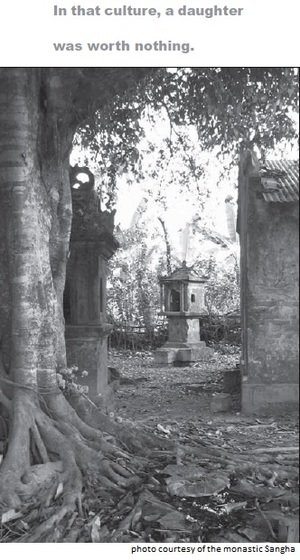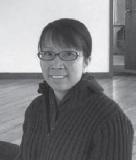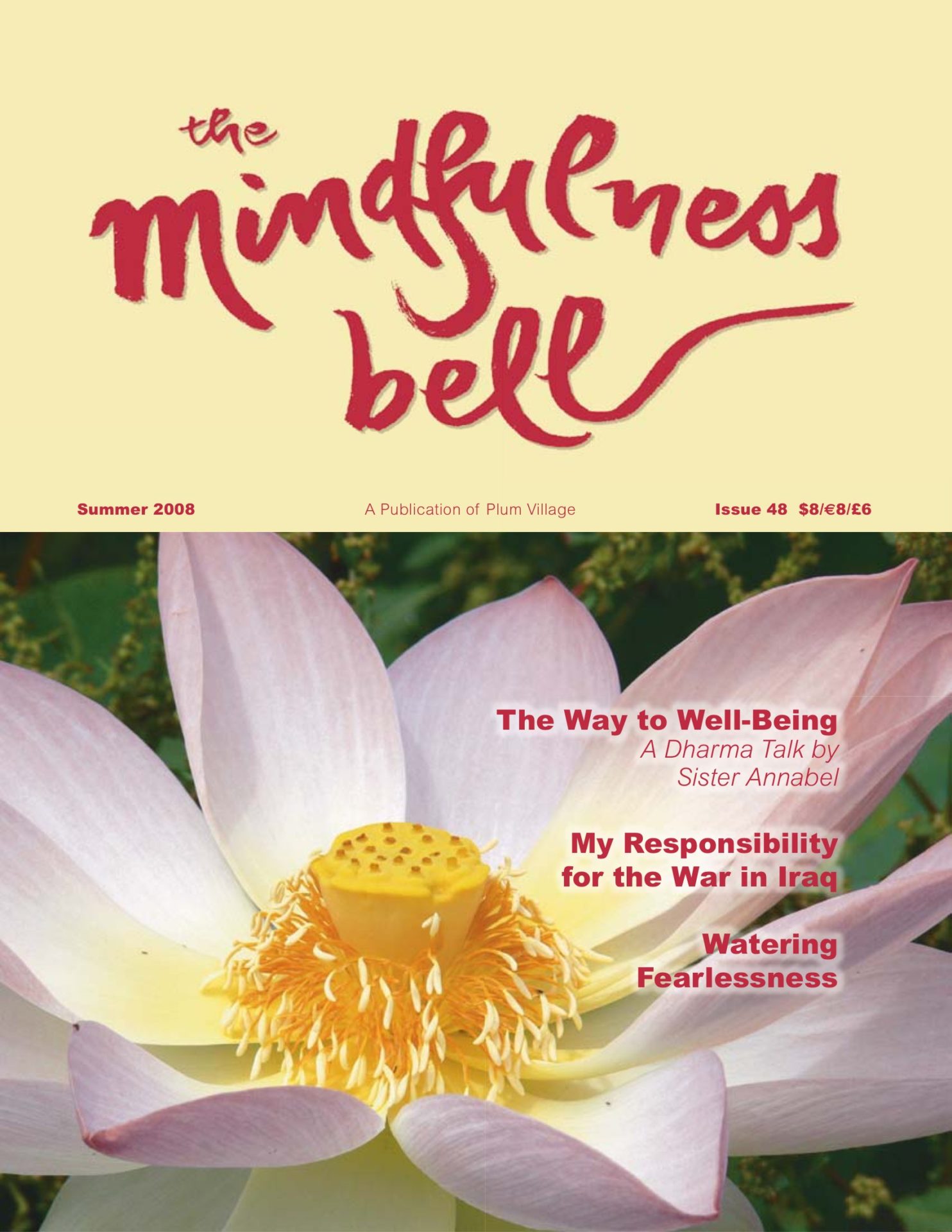
By Le Thu Thuy
When we arrived, the hallway in the Claymont Court building was filled with light. It was a cold, windy, winter night and the retreatants came in wearing heavy winter jackets. We hugged each other with deep breaths and beaming smiles. At dinner time, the sound of a gentle bell rang, subduing all noise and motion. The whole room became a completely quiet place. We had our first meal in silence.

By Le Thu Thuy
When we arrived, the hallway in the Claymont Court building was filled with light. It was a cold, windy, winter night and the retreatants came in wearing heavy winter jackets. We hugged each other with deep breaths and beaming smiles. At dinner time, the sound of a gentle bell rang, subduing all noise and motion. The whole room became a completely quiet place. We had our first meal in silence.
Before long, [Dharma teacher] Anh Huong appeared and sat in front of my husband and me. She gave us a gentle, motherly smile, and expressed her appreciation to my husband for driving me here. Anh Huong suggested that, as soon as we finished dinner, he should head home to be with our three teenagers, and assured him that I would be safe during my stay.
Being Nurtured in Body and Soul
As Anh Huong promised, I was safe and well taken care of. I was pampered with fresh country air, well fed with organic vegetarian food, and accompanied by gentle friendship. I noticed that the head cook often joined us in the sitting and indoor walking meditation. This time, she also joined us for the Touching the Earth meditation and sat next to me. At the end, Anh Huong carefully guided us through Hugging Meditation. We hugged each other in three long breaths of respect, appreciation, and love. The cook hugged the person on her right, then me, and by that time her eyes and mine were filled with tears. She carried the aromas of the foods that she had prepared. This fragrance touched my heart and carried my memory back to the cozy days in Vietnam, when I was awakened by the smell of the wonderful foods that my mother cooked for the Vietnamese New Year festival. In silence, I thanked the cook for all her tasteful and nourishing food. She was not just a cook, but a dear sister making meals for us. Some of her desserts were incredibly delicious. She baked the best brownies that I have ever tasted; I swallowed them slowly and savored each small bite.
On this three-day weekend retreat, I could do what I could not find the opportunity to do in my busy life — my mind and heart were with the food and drink in each meal. I loved to hold a cup of tea with both hands and let its heat warm my cold hands. I slowly drank one sip at a time. I felt the tea being absorbed gently by the tiny cells of my whole body. As the night came, and in the silence of the warm companionship of my two roommates, I quickly fell asleep. It was more like a vacation than a religious retreat as I actually had the time and space to rest.
A Daughter in a Confucian Home
Within the Sangha’s cradle, I allowed myself to be fragile. The little wounded girl inside of me had a chance to breathe, to sob, and to ask for compassion and acceptance. In her Dharma talks Anh Huong showed us how to practice no-self by looking at our hands. Using mindful and compassionate breathing, we looked deeply at our ancestors’ traits that exist in each vessel of our hands. Joining her invitation, I found my own suffering intertwined with my ancestors’ torments. By deeply contemplating the past, I recognized my mother, the only daughter of a well-established family that was deeply influenced by the teachings of Confucius.
My mother grew up with her voice being ignored and her presence considered irrelevant. In that culture, a daughter was worth nothing because her father believed that she would soon belong to another family when she married; he would invest very little in her education. My mother had a fifth-grade education — her younger brothers went to college abroad and later became a doctor, a professor, and a law enforcement officer.
I was more fortunate. My parents worked very hard to give me the best education in Saigon. Witnessing the lack of education and mistreatment that his only sister endured, my father offered me the same opportunities, attention, affection, and love that my brothers received.
Because we did not carry my mother’s family name, my siblings and I were often treated as outsiders by her father. Sadly, no one was aware of the seeds of unworthiness that played a big part in my mother’s identity and were quietly being passed on to her children. I often felt insecure and left out, while my siblings set ambitious goals to establish their own identities and reputation, perhaps as a way to mask their feelings of being rejected. We may achieve wealth and certain positions in our society, but we are often lost in coping with our frustration and resentment toward the maternal family.
I learned that the collective karma is much more powerful than I realized. As I consider my own past and my present way of living, I realize that I fill my days with activities to expand my intellect, to make acquaintances, to earn a comfortable living, and to help others, without realizing that the deep seeds in my consciousness are controlling my thoughts, my speech, and my actions. My knowledge of Buddhism and Christianity, including the satisfaction of doing good deeds, was not effective in reducing the potentially destructive effects of negative emotions. But in calmness and mindfulness, the Buddha’s wisdom and the Sangha’s compassion helped to shed light on this dark corner of mine.
My Grandfather’s Secret Love
I remembered spending many summer nights at my grandfather’s home. He had shown his care and love for me in private. He boiled hot water for me to bathe, told me stories of his childhood with his younger sister, his love for the first wife who died young while giving birth to their first son, read books, and instilled in me a love for literature and history. I no longer blame him for not being able to display that soft, gentle part of himself in public. I now understand that many men of his generation, living in such a culture, would not have known how to behave any differently. My resentment was melting away as my heart filled with his love for me and mine for him.
Walking on this path of understanding and love makes my soul soft and cleansed. Mistakes and regrets are a part of the past, while hope and happiness are right here under my steps.
Healing the Past
We live six hundred miles away from where my grandfather was buried twenty years ago. I never went to visit his grave. Modern transportation offered many opportunities to do so, but for many years, I have down-played the importance of such a visit and often found good excuses for not doing so.
Since I got back from this retreat, the newly found understanding and love for my grandfather made me, for the first time, want to visit his resting place. My husband drove my mom and me to Canada to visit his family and my uncle, who liked the idea that all of us would visit my grandfather. My uncle drove his wife, my first cousin, my mother, my husband, and me to the cemetery. He and my husband had a bonding talk in the front seat while my mom and I caught up on the stories of our lives with my aunt and my cousin in the back. We had a lovely time during the ride. It was a cold, windy day at the graveyard, but I dressed properly for the weather and felt warmed by the family love and reconnection. I stood in front of my grandfather’s grave and lit the incense. With mindful breaths, I first expressed my gratitude and respect for all the ancestors and then offered my wholesome feelings to my grandfather.
As we left the cemetery, a new chapter in the account of my maternal family tree was being written. It would record the fact that my grandfather has always been in me and will always be in my descendants. The DNA will always support this and nobody can deny or alter this fact. Gender, last name, and success will not signify how we relate to each other; real blood, true love, and a deep understanding will. Each individual has their own place in the universe. My experience proves that by deeply understanding the past and mindfully living in the present moment, it is possible to transform past mistakes and change the course of the present and future.
To Live as One
We’re all the leaves of one tree,
We’re all the leaves of one tree,
The time has come for all to live as one
We’re all the leaves of one tree
Lately, each time I sing that song with the Sangha, I see that my grandfather is joyfully singing it with me and we let each word sink deeply into each vessel of our body. Nothing could take us apart! I am a leaf of one tree just like my grandfather is and we are “falling gracefully without regrets” into the cradle of the Three Jewels.

Le Thu Thuy, Opening of the Awakening Heart, has been practicing for many years with the Boat of Compassion Sangha and the Mindfulness Practice Center of Fairfax, Virginia (MPCF) Sangha.

